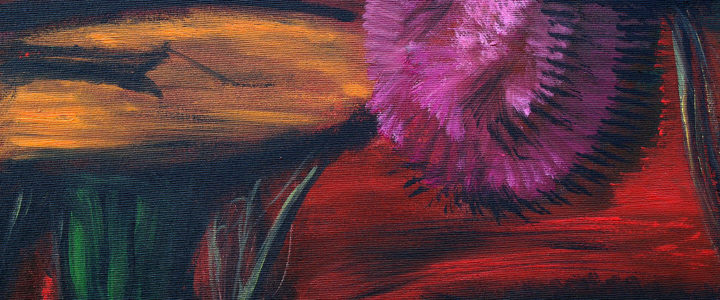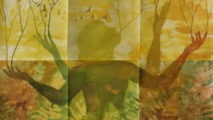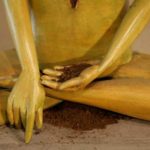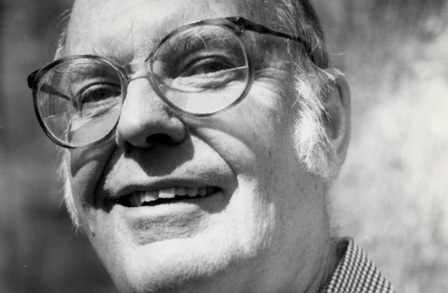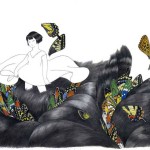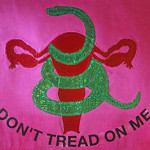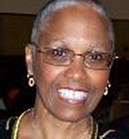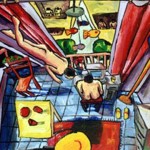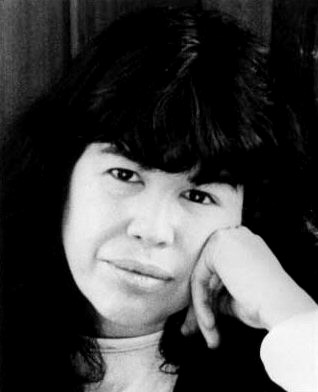I don’t like to drive out here anymore. I hate to see what’s happening to the land. Most of the marshes and trees and family farms are gone. Flimsy houses built with particle board and warped plastic siding take on names like Bay Side Acres, River View Manor, and Ocean Park, to validate their presence. The closer to the river and the bay, the more expensive they become. In the bulldozed fields, with stump fires of the last of the trees still burning, signs say new homes from the low 400s and up. The prices go up as the properties encroach closer to the water. The homes perched next to the river are shown by appointment only.
The storm last autumn washed most of the waterfront homes away. The contractors are already rebuilding. They walk through the debris dressed in comical green rubber boots and yellow hard hats. They wear the uniform of white, sweat-soaked shirts; clip-on ties; and rolled-up sleeves, which are supposed to signify the determination to dig in and get things done. The contractors tell the prospective buyers that the storm was a once in a century event. “This will never happen again in your lifetime,” they say. “You’ll be dead by the time the next one blows in.” They tell the buyers that they’re going to rebuild Bay Side Acres better than ever. They tell them they’re going to tame the tides. “We’re going to build a seawall, as high as it takes. Nature can foam at the barricades. The gulls can circle the lapping tide, scavenging the fish smashed against the wall. It’s all in your brochure, page seven.”
The buyers follow the contractors through the muck with black, numb feet; feeling for their toes inside their boots. The biting flies follow the stumbling feast, swarming in to sip the red nectar they smell beneath the peeling pink skin. The flies dive for the legs and neck, chewing down into the flesh. The sores they leave behind run and will not heal.
I was on my way to Mrs. Lucas’s house. She called me and said she had a list of things she wanted done. She asked me if today would be okay and hung up before I could give her my answer. My answer would have been yes. My answer is always yes to Mrs. Lucas.
Her farmhouse looked the same as all the remaining rundown farmhouses left in the county. It was an ancient colonial with a rusted tin roof and peeling white slat siding. The yellowed curtains were drawn against the sun. Big wooden poles strained under the weight of the sagging porch. Limbs and rooted plants protruded from the clogged gutters. Pits were gouged into the soil at the corners of the house where the water ran off. Green algae-caped frogs hopped from the edges of the puddles when they saw my shadow. Mockingbirds were building a nest in a nearby bramble rose. Vines grew up onto the roof and into the chimney. Weedy, uncultivated fields stretched out to the river a half mile away.
I can remember when the house was a showplace, blended in an oasis of native flowers, manicured shrubs and roses, and a soft, soft emerald rolling lawn. The cultivated fields were a panorama of rippling wheat, soybeans, and barley. White clover pushed out of the seams of the soil, blooming into a downy white mass, speckled and diffuse behind a brown blur of honeybees.
I took my boots off on the porch and went inside.
The kitchen looked nothing like I remembered. Dropped food and broken dishes littered the floor. The odor of mustiness and incontinence was settling in like the smell of decay at the edge of a swamp. The ceiling was bulging in places from an unrepaired roof leak. The crimson flowers in the wallpaper were hazed over like amber fossils. An old glass slag lamp hung down over Mrs. Lucas, casting a bronze spotlight over her. She held her left arm in a crook against her body to control the tremor. The dangling hand writhed in the air blindly, purposeless, like a crab tangled in a net. Her face drooped and the eye was shut on the side that had the stroke.
“My children are coming home next week. All of them at the same time. They said they want to talk to me about something. This means they’re up to something. Little children do sneaky things they don’t think parents notice. Hiding cookies, hiding candy, telling little lies. They think they get away with things until they get caught. They look surprised when they do. How did she know, they think. I had everything planned, no one saw me, no one heard me, nobody noticed. I always told them I had an eye in the back of my head. I told them I had antennas out all the time to detect mischief. I never told them that when I was young, I tried everything they did and other things they hadn’t even thought of.”
“Big children do sneaky things in a different way. The other day, out of the blue, I got a call from Linda, saying she’s coming to visit. She said she hasn’t seen me in a while, is next week okay? I say: ‘Sure, I guess. I haven’t seen you for a while either’ (since you drove off with my bronze lamp in the middle of the night), ‘look forward to seeing you.’ I told her that, since my stroke, I might need a hand to take care of some chores and heavy housework. ‘Bring some elbow grease. Sorry you missed the funeral. See you soon.’ Linda got a little scared about the elbow grease thing. She always hated hard work and couldn’t stand to sweat. She spent her whole life scheming to get out of things, and she was goddamn good at it. I figured she must really want to see me about something, willing to take a risk of sweeping and dusting and all. Then, I get a call from Mark, a few days later, saying that he suddenly remembered how beautiful spring is in this part of the country, and he wanted to drop by next week. I tell him sure. ‘Sure, why not. It’s been three or four years since I saw you. I know you’re sorry you missed Sara’s funeral. I know you had a once in a lifetime chance to close a deal in Hong Kong or Japan, or someplace like that. I wouldn’t want you to miss out on that. Once in a lifetime deals don’t come along everyday.’ Mark’s a funny little turd. He’s always traveling around the world on business trips that happen to pop up right around the time you need him for something. And then David calls. David was always the sneakiest one. When he got caught doing something bad as a child, he always teared up, and told me how sorry he was and looked up into my eyes and told me that he loved me. Then he hugged me around the waist. He knew as long as he hugged me there would be a reprieve from punishment, like a beaten boxer tying up an opponent in the ring. David says: ‘You know Marge’ (third wife, I think) ‘and I were talking last night and we had a thought.’ (Not likely) ‘We were thinking we haven’t seen Ma since, well, who knows when and we said, why not stop in and see her next week. So, we decided we’re going to fly in and rent a car and drive down and see how you’re doing.’ I said: ‘Sure, I’m always glad to see my kids so I don’t forget what they look like. By the way, your brother and sister will be here too.’ David says: ‘Well for crying out loud,what a coincidence. How about that!’ (Yes, how about that.) I say: ‘You can stop on the way and pick up a nice bouquet of Sara’s favorite flowers for her grave.’ He didn’t say anything. I know that David has no idea that Sara loved the wild pink rambling rose. Sara used to pick me a bouquet every spring. None of the kids have any idea of this. They’re going to call each other and try to figure this out and end up with hothouse roses or mums. None of the kids have any idea of anything; like children, still. Transparent as baby fish in a tank. You can look right through them and see the shit inside working its way through the intestines and down and out the bottom. These little fish think their pale baby scales can hide what’s inside. My scales are hard and plated like a gar’s. Nobody can see what’s inside of me anymore.”
“My kids are coming to try to force me into a home. Since my stroke they think I’m pretty well done with living on my own. Maybe I am, but this is my choice to make. I made up my mind that I’m not going to a nursing home. This is my home until I die.”
“The kids will tell me all that matters is my health and safety. ‘We want you to be safe, Mom, near doctors, near nurses, near other people your age. It’s dangerous to be unattended, old and alone trapped in a house at the end of a dirt road; out in the middle of nowhere. You should be in a Home roaming the halls in a gray pack with the others of your kind, hobbling toward the scent of food in the dining hall, shuffling toward the bingo hall. You shouldn’t be alone.'”
‘Oh, and the little matter about the property and the house and all that stuff. You don’t have to worry about it. We’ll take care of all this. We can lift the burden off your hunched little shoulders. We’ll handle things for you, Mom. We had some papers drawn up. A power of attorney it’s called. Just sign here, sign over here and initial here. Done and done. This will allow us to help you to make decisions for disposal of property, bank accounts, personal loot, and to pitch all the junk we think is junk. Way down in the fine print it says if Mom becomes incapacitated we can take over making all her decisions for her. The money has to go for her needs, of course, and used according to her wishes. That’s what it says. The leftover money we can gift to ourselves. We can sell the property if Mom isn’t in her right mind. That’s what it says. It says what we say it says.’
“Property means the land. I’ve had more than one developer sniffing around offering me money for the place. The offers keep getting higher and higher. One developer said he wants to subdivide and build condos on the river. City people love to come to condos on the weekends and watch the river rip into the tide like two saw blades working against each other. He told me last year they wanted to put docks in for the big white fancy boats. The boats are alway big and fancy and white. People used to name their boats after ladies, like an advertisement for a lifelong love. Now they think up names like Knot On-Call, Aquaholic and Knot Working: Names that let everybody know they’re on vacation on a boat they love away from a job they hate.”
“The first thing people think about old people is that they’re confused, deaf and stupid. They talk to you like a baby in a big loud voice. How do they figure that you grew up and took care of yourself and everyone else for all those years? Why would they think that you turned stupid and confused toward the end? You can’t watch a movie or TV show anymore without seeing some older person acting stupid and confused and not being able to tell their ass from their elbow. Some young person is always sitting there talking slow and loud right into the face of the dear old soul: ‘How… Are…You…Feeling …Today Honey? “Do…You…Want…Some…Nice…Jello? “Do…You…Remember…It’s…Time…For…Your…Bath? Hello. Hello. Hello. Do you remember anything at all? Is there anybody home? Is there anybody still inside that crusty noggin?’ Knock, Knock. Who’s there? Nothing. Nothing who? Just nothing. Nothing. Nothing.”
“On TV, when news is slow, meaning no important natural or man made disasters, and no dead Hollywood stars to report, the anchors sometimes do human interest stories. The young, bronzed stubble-faced man and the young blonde lady gush over the news of somebody turning a hundred years old. ‘It’s hard to believe she’s a hundred,’ says the blond cherub. ‘Yeah,’ says the man talking directly at the blonde cherub’s breasts, ‘she doesn’t look a day over ninety-five, ha, ha.’ Sometimes they interview the centenarians. ‘What’s your secret?’ ‘Secret for what?’ ‘For not being dead.’ ‘Oh, that. Just drink a glass of red wine for dinner. Helps build the blood.’ Another centenarian says: ‘no alcohol, ever; it destroys the nerves, gives you the palsy.’ Over the years, you hear all sorts of long life secrets from centenarians: ‘no tobacco, soots up the body like inside a chimney’; ‘a cigar a day, relaxes the nerves’; ‘plenty of vegetables’; ‘fish three times a week’; ‘no red meat’; ‘lots of red meat’; ‘olive oil’; ‘greens’; ‘getting up early’; ‘going to bed late’; ‘staying thin’; ‘staying plump’. Anybody can live to be a hundred. Just follow the rules. When Father Time comes around, just say no. Hide if you have to. Walk away. Run. Run faster.”
“The secret is that there is no secret. The truth is Mr. Death is a fallen angel on work release from Heaven, picking up trash with a nail-tipped stick along the highway of life. Maybe you weren’t noticed on the first pass, or even the second pass, but sooner or later here he comes along with the nail-tipped stick and into the maw of the black plastic bag you go. The flaps are tied shut.”
“Young people love to get over on old people. They’re secretly scared of the blue-veined, liver-spotted shrunken gnomes roaming the earth. They don’t like to be reminded of what they might see in the mirror some day if they manage to stay alive. They tell everybody that the old folks are senile and can’t think straight anymore. ‘She’s so sweet, a cutie pie, a dear, happy to be happy, and not to understand a goddamn thing.’ Old people know this isn’t true, but they can’t get out and about and tell people. Old folks are sometimes helpless and afraid. They press their panicked faces up against the glass in the nursing home day rooms like seals trapped under the ice in the Arctic. The weaker they get, the more desperate they get. They bargain away everything they have to keep out of a nursing home. When everything is sold off, they go into homes anyway. Paupers in a day room waiting for the rosy-cheeked keeper to tend them. ‘Hello, dear, I’m here to feed you pudding.’ Then I’ll wait and change your baby-shit diaper; then I’ll scrub every square inch of your sagging, parchment skin and put you into bed. And, lastly, here come the meds. Here come the meds! In little corrugated cups. Blue is a water pill; red is a heart pill; pink is for blood pressure; yellow is for sleeping; other colors are for other things. None of this is true, you know. We dye sugar pills like Easter eggs at the nurse’s station and shake them up in a specimen jar. Pot luck, dear. Take your pills, nighty-night, go to sleep, Goodbye. I’m off on my date, lusty, ripe and primped. If you’re still here in the morning, I’ll shake you awake and bend down, and talk into your face through a big toothy smile. ‘Good morning, dear. Good morning, honey.'”
“Bo, Sara’s only child, is a lawyer now. We helped put him through school. A lot of people around here at the time didn’t like that. Not many black children went to college back then. Bo was a sickly child, and we tended him together, day and night. We took turns nursing him. I was so young and afraid. I didn’t know if he was going to make it. I didn’t know if Sara and I were going to make it. Things were so different then and hard. I made a choice and offended everyone except God. Sara told me that love was the magic that would float us above the rough spots. If love leaves, the magic leaves, and the body falls out of a bubble onto the hard ground. She told me that would never happen to us, and it never did.”
”Bo helps me now when I need him with legal stuff, and he never charges me a dime. Right after I got back from the hospital, Bo drove out to the house to see me. He pulled a chair up next to mind and said to me: ‘Kate, you need to make a will.’ He sat across from me and looked me in the eye when he said this. ‘You need to make a will, because when you die all hell will break loose among your kids. It would take King Solomon to divide things out, and in the end the land would be parceled out, bulldozed, and ruined. The red clay would bleed down into the bay.’ He told me he was driving me downtown to make a will and wouldn’t take no for an answer.”
“He drove slowly over the rutted spots in the road, making sure the seat was comfortable for me, making sure the air was just right. I could smell the musk rose scent coming through the little vents, squeezing through the pores of the car. Nothing can keep the scent of musk rose out.”
“Bo took me first to see a psychologist. I call them head doctors. Bo explained that the doctor was a geriatric expert and would test my memory and thinking ability. Bo said that it was important to get an expert opinion to see if I was competent to make a will.”
“The doctor looked like how you would picture a head doctor. He was a small man in a striped suit with gray hair and a pointed, trimmed beard. He was friendly in a fake way, not naturally good with people, struggling with the struggle to be good with people. He was used to studying books. He didn’t like people up close. He wore thick magnifying glasses to examine the bugs that crawled under his office door.”
“The doctor started out by asking me if I knew where I was and why. I told him that I was with my attorney in a head doctor’s office because he wanted to get me tested to see if I was competent to make a will. The doctor asked me why I thought I needed an evaluation to make a will. I told him my attorney suggested this because any will I made would be contested by my children. I explained that I haven’t seen much of my kids since they were in their early teens because the state took them away. The state said I was an unfit mother because my partner moved in with me a couple months after my drunken husband got run over by a train. My drunken husband was my first and only boyfriend. He was a drunk even then and made me get drunk along with him. When I got pregnant I had to get married because that was what I was supposed to do. Then, I had three children, one after the other. When my husband died and Sara moved in, my kids turned me in to the child welfare agency. Two people from the agency came out to my house to investigate. The house was spic and span, not a speck of dust or dirt. I even ironed all the curtains. I introduced them to Sara, who sat next to me on the couch. I told them that I was running a profitable farm, paying my taxes on time, feeding and clothing the kids, getting them anything they needed, not abusing them, not neglecting them, or anything of the sort. The agency people asked me if I was living with another woman. I said that I had a lifelong companion who shared her life with me. Then they asked me if we were cohabitating, meaning sharing a bed and I said yes, one bed. The two agency people looked at each other, packed up their stuff, closed their notebooks, and left. They didn’t say a word. I told Sara that I shouldn’t have ironed the goddamn curtains.”
“The court can act fast dealing with issues like immoral people. Drunk drivers get multiple chances before they finally kill or maim someone. Politicians can misspeak and steal and get re-elected. Even wife beaters get second chances, third chances or as many as it takes to break a jaw, throw somebody down a flight of stairs and finally kill. They’re remorseful, crying, dressed in new blue suits when they stand before the Judge. ‘My client is a changed man, Your Honor, has no priors except for a few irrelevant DUI’s and one animal cruelty violation. The prosecution agreed to our plea of involuntary manslaughter. My client is ready to face his 18 months in jail. He apologizes to everyone. He’s sorry he can’t apologize to his dead wife.'”
“When the court deems somebody immoral, there is no second chance. No trial, no appeal.
The sheriff and two deputies came and took away my kids. The kids were put in foster care. They were told that they could see me, with supervised visits, if they wanted. They never did. The court didn’t bother with Bo though. There was no complaint and so he didn’t matter. He could stay.”
“The doctor tried to explain a little bit about domestic violence to me. He said something about deprived childhoods, rotten fathers and mothers, feelings of inferiority, the need to control and a whole bunch of other stuff. I told the doctor that some people were just born as mean bullies, carrying around a grudge for no particular reason. I said that most of the red-faced screamers packed tiny pistols in their tighty-whities that shot blanks most of the time. This was the real problem. A little rosebud hiding below a fuzzy beer belly causes all sorts of anger issues if the audience is laughing.”
“The doctor started testing me. He asked me what day it was, and I told him, ‘Wednesday.’ ‘What’s the date?’ ‘The 21st.’ ‘What’s the month?’ ‘July.’ (I got all this off his desk calendar) ‘Who’s the President?’ I told him. ‘Who was the President before that?’ I told him. ‘Who is this man with you?’ ‘My attorney, my friend, my son.’ Then he says he’s going to test my recall. ‘Here goes’, he says. ‘Ready? I’m going to read a story, and I want you to recall as much as you can. A man in Chicago gets ready to go out for the evening and checks the weather on TV before he leaves. The weather person reports that storms are moving in. The man decides to stay in and watch old movies and order pizza. The pizza was cold when he got it, and the old movies were boring. The man shuts off the TV and takes out his phone. He plays games until he dozes off. He doesn’t hear the rain sheeting against the window. He doesn’t see the white teeth gnashing on the surface of the lake.'”
“The doctor asks me how much I remember and I tell him the whole story word for word. I told the doctor that the story was easy to remember because lonely people pretty much do the same things. They get depressed; they run out of options; they get afraid and don’t take chances; and the walls close in. I told the doctor that the man should get out of his apartment, meet a nice person, have a shared life and a shared identity, get a better job, move out to the country, and take in the fresh air. There’s always fresh air in a new place.”
“The doctor writes down a whole bunch of stuff after more memory tests. Then he asks me to step out into the waiting room. Bo finally comes out and drives me to his office.”
“Bo told me that the doctor said I was competent, and that he would send the report as soon as he had it transcribed. Bo said that he would attach it to the will. He said the will would be meddle-proof. I put the land in trust to a preservation society. The will stipulates that the land will never be developed. The archaeologists will dig their square window panes into the earth and look through them to see into the past.”
“Sara and I dug a lot of old things out of the ground during the years of farming. Some of the things were colonial, but most were native artifacts. Arrow points, spearheads, fishing net weights and other things. I left them all in the earth. One old stone bowl was still yellow inside from ground corn. I thought of the woman holding the bowl a thousand years ago, making dinner for her family and singing to a baby. The baby watched with dark eyes and smiled at the woman. The woman smiled back. She sang the willow song: The willow tree is broken by the storm; the willow tree is no more; the willow branches drift to shore; they root among the Tuckahoe; the willow lives on and never dies.”
“Sara and I used to sneak out to swim in the river when we were young. We waited until the flood tide started to retreat back into the bay and waded in hand in hand. The water was warm in high summer, and the eel grass caressed our legs as we drifted. The musk roses grew in groves right up to the water in places, and the scent hung over us in a veil. We let the tide pull us toward the bay, pushing off with our toes in the shallows to keep afloat and treading water in the deeper spots until our toes brushed the bottom again. We floated for miles, watching the herons and ducks flush from the cord grass along the shore and breathing in the musk of the roses. Everything was alive in the grass in the river, and on the shore and in the sky. We drifted along, laughing and splashing, merged in a procession, two wet girls: part of the tide, part of the earth turning, part of the moon pulling, part of the everlasting, full of joy, in the water for the sheer pleasure of being there, and able to be there. Pure pleasure of being alive and in love.”
“We drifted for miles and stepped out into the shallows of the sandy beach near the bridge. This is the last place to get out before the water drops off into the deep over the oyster bars and into the ribbons of churning water funneled between the pylons. Beyond the bridge, the bay is wide and deep where the sleek-bodied fish school and dive into the dark filaments of shifting shadows. The flotsam, caught at the surface, bobs and swirls, captured by the tide, drifting and merging at the horizon and into the expanse of the sea.”
Dan Gemmer is a retired state adult protective service investigator and also an Army combat veteran. He has been published in the Belleview Literary Review and in Pembroke Magazine. He received the New Millennium Short-Short Fiction prize and was a finalist for the Iowa Review Fiction award and the Arts and Letters Fiction award.
